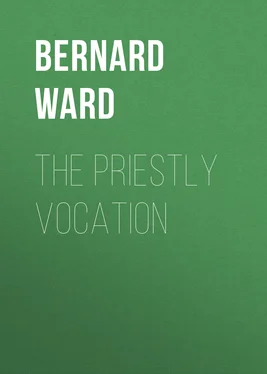Bernard Ward - The Priestly Vocation
Здесь есть возможность читать онлайн «Bernard Ward - The Priestly Vocation» — ознакомительный отрывок электронной книги совершенно бесплатно, а после прочтения отрывка купить полную версию. В некоторых случаях можно слушать аудио, скачать через торрент в формате fb2 и присутствует краткое содержание. Жанр: foreign_prose, foreign_religion, Философия, foreign_psychology, foreign_antique, на английском языке. Описание произведения, (предисловие) а так же отзывы посетителей доступны на портале библиотеки ЛибКат.
- Название:The Priestly Vocation
- Автор:
- Жанр:
- Год:неизвестен
- ISBN:нет данных
- Рейтинг книги:3 / 5. Голосов: 1
-
Избранное:Добавить в избранное
- Отзывы:
-
Ваша оценка:
- 60
- 1
- 2
- 3
- 4
- 5
The Priestly Vocation: краткое содержание, описание и аннотация
Предлагаем к чтению аннотацию, описание, краткое содержание или предисловие (зависит от того, что написал сам автор книги «The Priestly Vocation»). Если вы не нашли необходимую информацию о книге — напишите в комментариях, мы постараемся отыскать её.
The Priestly Vocation — читать онлайн ознакомительный отрывок
Ниже представлен текст книги, разбитый по страницам. Система сохранения места последней прочитанной страницы, позволяет с удобством читать онлайн бесплатно книгу «The Priestly Vocation», без необходимости каждый раз заново искать на чём Вы остановились. Поставьте закладку, и сможете в любой момент перейти на страницу, на которой закончили чтение.
Интервал:
Закладка:
In recent years, however, this question has been settled permanently. Whatever the effect here in England of the legislation of Pius X— about which there has been some difference of opinion—in the revised Canon Law it is laid down that in all countries in which there is a Hierarchy, the rectors of the churches are to be "Parochi"; but whether or not they have security of tenure is left to the Bishop to decide in each case. It is possible that our custom in England may continue without much change, and only those who have what were formerly known as Missionary Rectories will have true security of tenure: that, however, will depend on the individual Bishop. But at least, we can say that those who are called to work long years without such security, will be called to practise the virtue of poverty in a higher degree than the others. A priest with the true missionary vocation will do good while he can, and leave the future in the hands of God. The practice of a priest saving up money for his old age is not indeed to be condemned, but it is the less high course. How many have done this for years and then the last summons came to them while still in middle life, so that they had to leave their savings for others to spend.
5. Surrender of Liberty. The consideration of this can be postponed until the Conference on Obedience. Конец ознакомительного фрагмента. Текст предоставлен ООО «ЛитРес». Прочитайте эту книгу целиком, купив полную легальную версию на ЛитРес. Безопасно оплатить книгу можно банковской картой Visa, MasterCard, Maestro, со счета мобильного телефона, с платежного терминала, в салоне МТС или Связной, через PayPal, WebMoney, Яндекс.Деньги, QIWI Кошелек, бонусными картами или другим удобным Вам способом.
CONFERENCE IV
WE are often asked by non-Catholics why it is that priests are not allowed to marry. It is a difficult question to answer in a few words, and becomes the more difficult from the obvious inability of even a well-disposed person who is not a Catholic to understand our view of the matter. We should probably answer by appealing to the conveniences of the rule. A man who is unmarried is free from encumbrances; he can go where he is sent at short notice; in his daily life all the time and thought which he would otherwise spend on the affairs of his home and the bringing up of his children can be devoted to the direct work of his ministry. We might perhaps quote the words of St. Paul: "He that is without a wife is solicitous for the things that belong to the Lord, how he may please God; but he that is with a wife is solicitous for the things of the world, how he may please his wife; and he is divided." 21 21 1 Cor. vii. 32, 33.
Or we might point to financial considerations to show that it is a useful rule, for an unmarried priest can be supported on a far lower income than a married one. A somewhat similar rule applies to the army, and for similar reasons, with this important limitation, that soldiers cannot be expected to deprive themselves permanently of matrimony, so that the limit of the rule is to restrict it to a certain percentage, and to those of a certain age; whereas priests being called to a more self-denying life, are expected to do without it permanently.
All this is true as far as it goes; but we ourselves know that this is only one aspect of the subject, and that not the most important one. The fact that the Church faces scandals among the clergy in every age of her history, without showing any inclination to relax the rule, would surely point to the fact that there are greater issues involved than mere questions of finance or convenience. These scandals are indeed happily few—very few—in proportion to the total number of the clergy; but they are sufficiently numerous and sufficiently grave to make us certain that the Church would not insist on the rule which makes their recurrence possible, but for a good of surpassing and all-pervading importance.
In fact the Church has ever spoken with no uncertain voice on the excellence of the celibate over the married state. Not that she underrates the latter; on the contrary, by raising matrimony to the dignity of a sacrament and insisting on its indissolubility, she has done much to raise the standard of domestic virtue and domestic happiness, and to emphasise the greatness of the Christian home and family. But St. Paul says, "He that giveth his virgin in marriage does well"; but "he that giveth her not does better"; 22 22 1 Cor. vii. 38.
and the celibate state has ever been regarded by the Church as higher than that of matrimony.
In fact it would seem that the married state, great as it is, is hardly compatible with the highest sanctity: scarcely an instance occurs to mind of a canonised saint who died in the married state, except martyrs whose sanctification was accomplished by the very act of death.
Nor is there any difficulty in discerning our Lord's special love for celibacy or virginity. An esteem for virginity was indeed the creation of Christianity. Even to the Jews, for a woman to have no children was considered a reproach, 23 23 St. Luke i. 25.
if for no other reason, because it destroyed any possibility of the Messiah being descended from her. It was our Blessed Lady herself who first broke through this prejudice. For her answer to the Archangel Gabriel can only mean that she esteemed the privilege of being ever a virgin more than the prospect of having the Messiah descended from her, or even that He should be her own son. It was only when it was explained to her that by a special dispensation of Providence her mothership was to be compatible with her continued virginity that she gave the requisite consent, and the Word was made Flesh within her womb. It is perhaps a thought that we might make more prominent in our spiritual life that Mary, whom we love to regard as the guardian of a priest's celibacy, was in truth the first in this world to discover the excellence of that state, and the first to practise it as a virtue.
And there are other instances where our Lord showed His special predilection for this virtue. The "disciple whom Jesus loved," whose head was on His breast at the Last Supper, who stood beneath the Cross, and received the commission to be the guardian of our Lady during the remainder of her sojourn on this earth, according to tradition practised this virtue throughout his life in all its fulness, so that the Church on his feast day calls out, "Valde honorandus est beatus Joannes, quis upra pectus Domini in coena recubuit; cui Christus in cruce matrem virginem virgini commendavit"; and again, "Diligebat eum Jesus quoniam specialis praerogativa castitatis ampliori dilectione fecerat dignum: quia virgo electus ab ipso, virgo in aevum permansit. In cruce denique moriturus huic matrem suam virginem Virgini commendavit, quia virgo electus ab ipso, virgo in aevum permansit."
These thoughts might easily be developed; but it is unnecessary, as— theoretically at least—we are all familiar with the idea. Nevertheless, there is often a danger that we may lose sight of its essence—that we may look upon celibacy as a mere disciplinary law of the Church, made for prudential reasons, and our duty as merely to abstain from every thought or act which may endanger its observance— to look on celibacy, in short, as a negative rather than a positive precept, forbidding us to do this or that, but not adding anything very special to our daily spiritual life, beyond absence of sin. Yet this gives one a very inadequate idea of what should be to us a most positive virtue, affecting our whole lives, giving to the priesthood our greatest glory, and to our lives the note of heroism.
Читать дальшеИнтервал:
Закладка:
Похожие книги на «The Priestly Vocation»
Представляем Вашему вниманию похожие книги на «The Priestly Vocation» списком для выбора. Мы отобрали схожую по названию и смыслу литературу в надежде предоставить читателям больше вариантов отыскать новые, интересные, ещё непрочитанные произведения.
Обсуждение, отзывы о книге «The Priestly Vocation» и просто собственные мнения читателей. Оставьте ваши комментарии, напишите, что Вы думаете о произведении, его смысле или главных героях. Укажите что конкретно понравилось, а что нет, и почему Вы так считаете.












